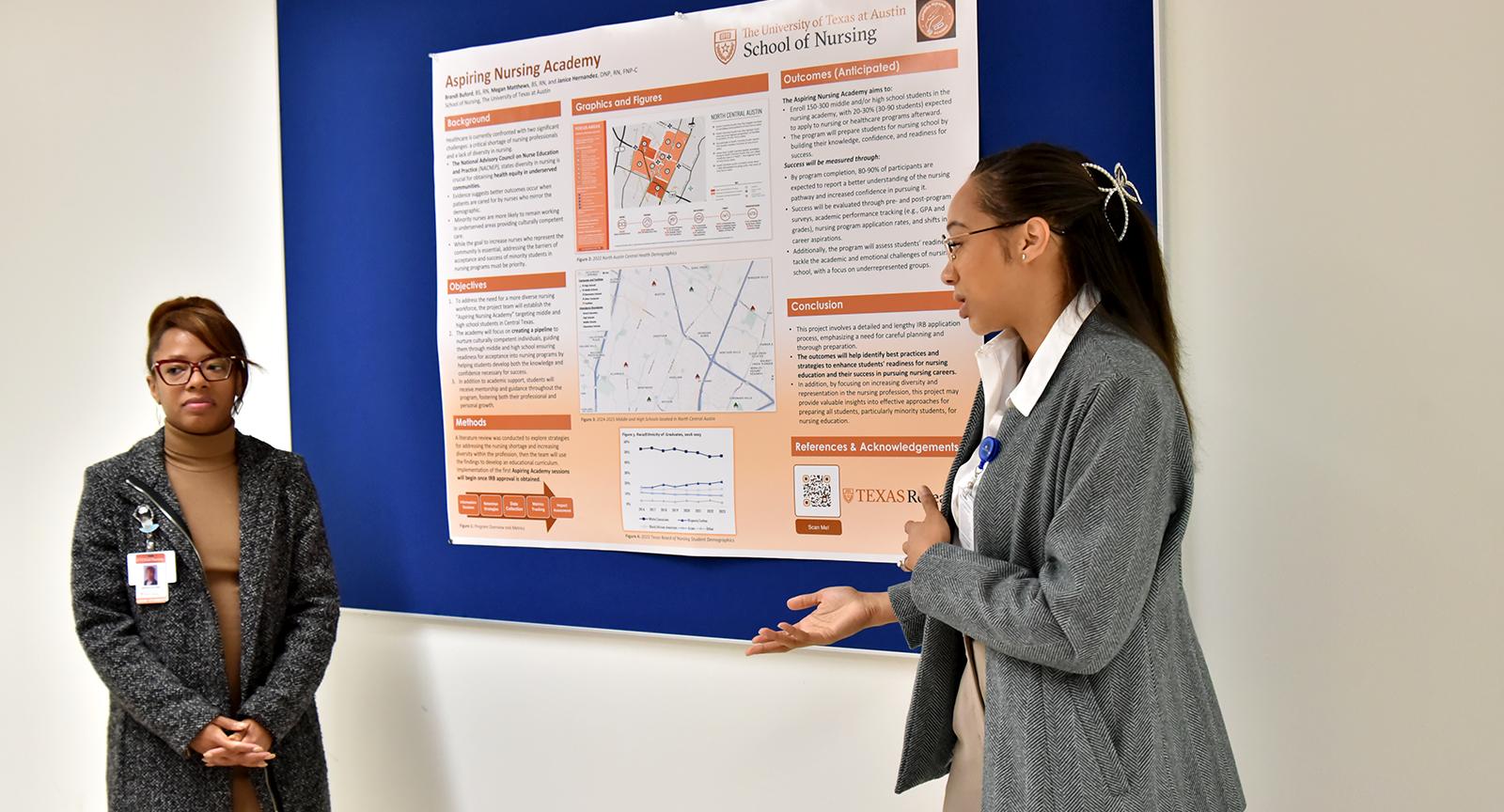
The Leadership in Diverse Settings (LeaDs) master’s program at The University of Texas at Austin School of Nursing hosted its Capstone Poster Showcase on Dec. 5, 2024, where students presented their project posters, highlighting their innovation and dedication to improving patient care.
“The LeaDs Capstone Projects are important contributions to improving patient care and health care system across various health care settings,” said Janice F. Hernandez, DNP, RN, FNP-C, LeaDs program director and clinical associate professor.
Improving patient care
The LeaDs program is a master’s-level curriculum created to meet the national and local demand for nurses to step into leadership roles across diverse health care settings. It equips graduates with a comprehensive skill set to excel as leaders in patient-centered health care, community and educational environments. Upon completing the program, graduates are uniquely prepared to drive change and navigate the complexities of dynamic and challenging settings.
Typically completed during the final semester of the LeaDs program, the Capstone project involves students conducting an Evidence-Based Practice (EBP) or Quality Improvement (QI) initiative. This comprehensive project synthesizes learning from the entire program, showcasing the application of systematic inquiry to address a specific health issue or problem.
The successful completion of the LeaDs Capstone Project highlights a student’s mastery of the American Association of Colleges of Nursing (AACN) Essentials: Core Competencies for Professional Nursing Education, which is the foundational framework for all master’s nursing programs. Disseminating findings from QI or EBP projects is vital to the LeaDs curriculum, fostering knowledge sharing, advancing the nursing profession and shaping health care policies and practices.
A nursing pipeline project that’s personal
One project, the Aspiring Nursing Academy, a Capstone Project by LeaDs students Brandi Buford, BS, RN, and Megan Matthews, BS, RN, seeks to address the critical shortage of nursing professionals and the lack of cultural representation within the field.
The project targets middle and high school students in Central Texas, aiming to create a pipeline of students interested in pursuing nursing careers. The academy’s goal is to provide opportunities for skill-building and professional development to strengthen participants’ knowledge, confidence, and readiness for nursing programs. Its primary objectives are to increase the number of students entering nursing pathways and to support them as they navigate the challenges of preparing for nursing school, while fostering overall academic and professional growth.
Matthews said this project stems from her own journey into nursing.
“I can speak from personal experience—had I known more about what nursing was, I wouldn’t have been an alternate entry nurse,” Matthews said. “I didn’t get my bachelor’s in nursing, and it wasn’t until after I completed a bachelor’s that I came back and decided that I wanted to be a nurse. I didn’t know what nursing was, what it involved and how it could affect people’s lives and make a difference in my community. For me, this is something I would’ve been interested in had I known at a young age I could’ve worked towards that sooner.”
This project aims to provide valuable insights into how targeted academic and emotional support can help underrepresented students thrive in nursing programs and contribute to health care.
“For me personally, I wanted to be in a place where I can be a representative in my community and my family,” Matthews added. “During the pandemic, I saw there was a real need for understanding between health care professionals and patients. That’s when I decided to join nursing.”
She said patients may not fully comprehend medical terms or jargon, so it’s important to use language they can digest.
“I had to learn the information to be able to provide it to other people. Patients don’t always understand high-level medical terms.”
Similarly, Buford said she wanted to go into nursing and be a part of the LeaDs program to become a representative in her family and community.
“In the Black community, we eat and drink certain things that can turn into hypertension, which can lead to kidney failure. “I specialize in dialysis, and I have family members who take hypertension medication, and I tell them to be careful because I don’t want them to become my patients.
A variety of settings
Leadership development and innovation are central to the goals of the LeaDs program. By focusing on essential leadership competencies, the program prepares graduates to manage and lead in hospitals, community health organizations and educational institutions, all while emphasizing the importance of bedside leadership.
Students also gain strong project management skills, enabling them to plan, implement and evaluate initiatives such as quality improvement projects, patient care advancements and system-level changes. Through a focus on change management and innovation, the program empowers students to address complex challenges in health care systems, including resource allocation, health care delivery and policy reform, with forward-thinking solutions.
“The LeaDs program proudly upholds the "Guiding Principles for Academic-Practice Partnerships" established by the AACN,” Hernandez added. “We recognize that academic-practice partnerships are the basis of success for our program, students and the health care organizations we collaborate with.
Hernandez said, that for the School of Nursing, the program increases partnerships and collaboration with community networks.
“Together, we lead positive changes in health care, patient care and nursing education. Our commitment to our students, preceptors and networks aligns perfectly with our mission to prepare students to lead in diverse settings. We make a meaningful impact together.”
Learn more about the MSN LeaDs program and AE-MSN LeaDs program.